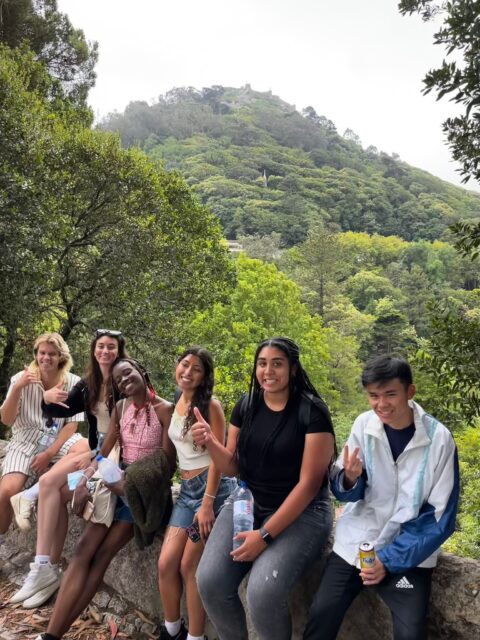Above: UC Santa Cruz students during their internship in Lisbon (from left to right): Kristie Charter (Merrill ’22, psychology); Odeosa Eguavoen (Kresge ’22, intensive psychology); Abrianna Merino (Oakes ’23, intensive psychology); Linda Nguyen (Crown ’23, linguistics, psychology) (Photo by Odeosa Eguavoen)
The term “study abroad” can have different connotations to different folks—a time to embrace different cultures, develop new relationships, explore a foreign country, and expand their learning in unexpected ways. But for students connecting with the Division of Global Engagement at UC Santa Cruz, study abroad is so much more.

(Left to right): Josh Wellsted (Rachel Carson ’23, psychology), Kristie Charter, Odeosa Eguavoen, Valeria Aguirreche (’22, cognitive science), Abrianna Merino, and Franklin Chen (College Nine ’22, cognitive science) (photo by Odeosa Eguavoen)
Odeosa Eguavoen (Kresge ’22, intensive psychology) had wanted to go abroad even before starting at UCSC. When COVID-19 hit in her sophomore year, she took the time to attend virtual workshops and plan for a trip in her senior year.
“I took a deep dive into the process, hoping for the best, and it thankfully did turn out that way,” she said.
During her internship in Lisbon, Portugal, Eguavoen said her self-confidence and ability to manage social anxiety increased, and the experience fueled a passion for travel.
When she returned to campus, she worked with Ashley Bayman, Global Learning coordinator and adviser, as part of her Benjamin A. Gilman International Scholarship follow-on service project, to develop a presentation for her fellow African, Black and Caribbean (ABC) students. She also learned a great deal from the other participants—some of whom had never traveled outside the U.S., been on a plane, or even left Santa Cruz—about their own travel journeys.
While in Lisbon, Eguavoen enjoyed exploring the city both solo and with her fellow students, and recalled a boat tour that was one of the last group activities for the program.
“It was overall a very exciting vibe—this was, personally, the highlight of my undergrad years,” she said.
Global opportunities
The Division of Global Engagement oversees four units: International Student and Scholar Services, Global Learning, Global Programming, and Global Initiatives. Under the Global Learning unit, students work with staff members to find mutually beneficial international and virtual programs, internships, global seminars, and even domestic study-away opportunities in Washington, D.C.
When Director of Global Learning Alice Michel began with the division in 2007, Global Engagement offered “traditional study-abroad” opportunities, in which a student could go abroad to a host institution and focus on academic coursework; now, there is a much wider variety of what students can do globally.
“We’ve expanded to incorporate more experiential-learning opportunities for students, to better align with campus priorities and with the UCSC Strategic Plan for Internationalization,” Michel said. “But also to provide students with what they are looking for.”
Michel notes that students have begun to make “more careful choices” about what they do while at UC Santa Cruz, being more conscientious about the activities they partake in outside of the classroom.
As such, UCSC Global Internships provides that sweet spot for students to get the best of everything—academic, professional, and personal growth—with its more recent opportunities. In the Global Internship program, students go abroad for eight weeks, completing UCSC coursework and an internship while there.
The psychology global internship is now in its second year, and this summer, the division partnered with the Latin American and Latino Studies Department to offer an additional global internship.
In total for summer 2023, there are over 60 students interning and studying in Dublin, Ireland; Barcelona, Spain; and Buenos Aires, Argentina.
“Our intention is to amplify the types of opportunities that are available to students at UCSC through our office,” Bayman said.
‘Total fairytale’
From Barcelona, rising senior Patrick Harte (Porter ’24, psychology) calls the experience a “total fairytale.” He traveled to Barcelona with his fiancée for the eight-week program, and they both loved experiencing the culture, diversity, architecture, and food. Harte has also made friends with other people in the city, and is planning to explore more with them.

The Sagrada Familia in Barcelona is the unfinished masterwork of renowned Catalan architect Antoni Gaudi (photo by Patrick Harte)
“It’s honestly been one thing after another—visiting Montserrat, the Sagrada Familia,” he said. “It’s a wonderful journey.”
Harte has also been able to continue interviewing Santa Cruzans for his weekly radio show “What to Be?” for KSQD, and shares how delightful and unexpected it’s been to connect with people back in Santa Cruz all the way from Spain.
Guneet Hora (College Nine ’23, legal studies and psychology) explained that the program was a hands-on experience, and she was able to build solid relationships with the other students while in Portugal last summer.
“We learned together as a cohort—about the culture, the language, the city [Lisbon] itself,” she said. “Everything we were doing was a shared experience that was really nice to have together.”
Further, Hora said, the whole experience “strengthens your power in your own abilities.”
As Harte said, “it’s an absolute privilege to be here and learn, and to grow and do the things that are uncomfortable, because that’s where growth tends to happen.”
As Michel noted, students involved in UCSC Global Internships have the opportunity to expand on their collegiate experience through this unique opportunity, which can help to open doors postgraduation.
“No matter what career they go into, they have to be successful in navigating different cultures,” she said. “Being able to build early on those intercultural communication skills is incredibly valuable.”

